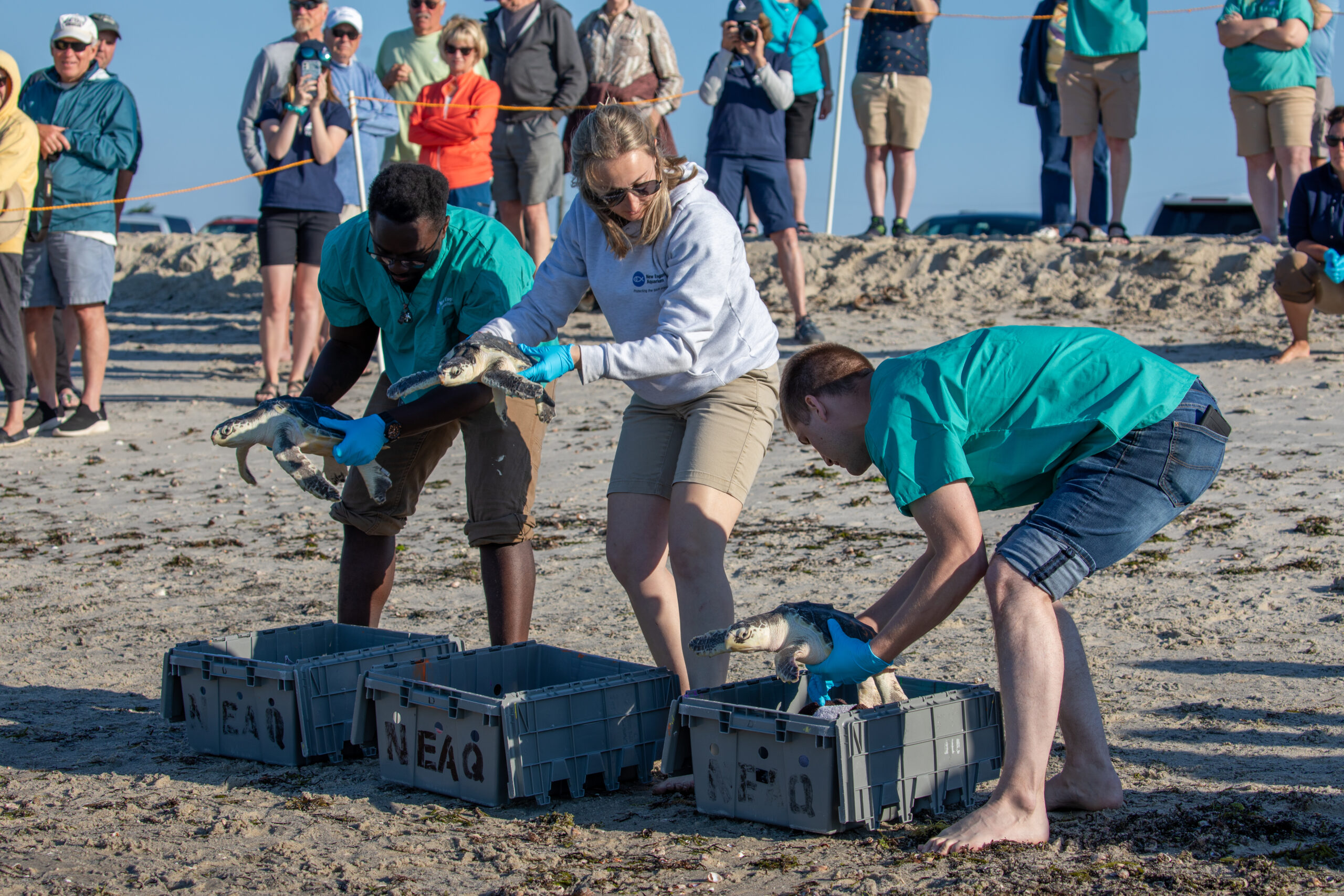
BOSTON, MASS. (June 25, 2024) – After months undergoing rehabilitative care at the New England Aquarium, eight critically endangered sea turtles are back in the ocean waters off Cape Cod after fully recovering from their life-threatening injuries.
**PHOTOS AND VIDEO AVAILABLE HERE, WITH CREDIT TO NEW ENGLAND AQUARIUM**
The turtles spent several months at the Aquarium’s Sea Turtle Hospital in Quincy, MA, undergoing treatment for hypothermia-related conditions including pneumonia, dehydration, and emaciation, all results of being unable to regulate their body temperature in the cold waters of Cape Cod Bay last fall and winter. After physical examinations, staff veterinarians cleared the Kemp’s ridley sea turtles to return to Nantucket Sound off West Dennis Beach on Tuesday morning.
“The first release of the summer is always a special time. Remembering how these turtles pass through our doors in the late fall—some of which appear lifeless, all of them needing our care—and having them reach this point of heading home to the ocean is an amazing feeling,” said Adam Kennedy, Director of Rescue and Rehabilitation at the Aquarium. “We strive to ensure this species continues to exist, and our conservation efforts and research are helping to do just that.”
Aquarium staff, volunteers, and interns have a tradition of naming the turtles receiving long-term care. The turtles released Tuesday are Electric Daisy, Dragon’s Breath, Lady Slipper, Dahlia, Cosmos, Lily Pad, Catmint, and Turtlehead. Dragon’s Breath and Catmint were very critical upon arrival and were placed on a mechanical ventilator machine to assist with their breathing. The majority of turtles were treated with both antibiotics and antifungal medications in addition to a variety of supportive care treatments.
Kemp’s ridley sea turtles are a critically endangered species, facing threats including fisheries interactions, climate change, ocean pollution, and degradation of their habitat. Rescue and rehabilitation efforts help to conserve this species.
During the 2023 cold-stunning season, the Aquarium treated 394 live sea turtles that were rescued from the shores of Cape Cod in November and December by staff and volunteers with Mass Audubon’s Wellfleet Bay Wildlife Sanctuary. Aquarium veterinarians created individualized medical treatment plans for these turtles that required months-long care.
“These turtles arrive to us with a range of ailments from severe pneumonia to metabolic imbalances and traumatic injuries. With months of dedicated care and treatment in our Sea Turtle Hospital, we witness their amazing recoveries. They regain their physical strength, recover from their various conditions, and are resilient enough to return to the ocean,” said New England Aquarium Senior Veterinarian Dr. Kathy Tuxbury.
In addition to Mass Audubon’s Wellfleet Bay Wildlife Sanctuary, the Aquarium works closely with the National Oceanic and Atmospheric Administration’s (NOAA) Fisheries Service and the nonprofit organization Turtles Fly Too to save the sea turtles, many of which are transferred to partner organizations across the country to continue rehabilitation to clear up space in the Sea Turtle Hospital to allow for care of additional incoming stranded turtles. There are 27 turtles remaining at the Aquarium’s Quincy facility, which will be released off Cape Cod this summer once medically cleared by Aquarium veterinarians.
More details on the released turtles:
- “Electric Daisy” (#103) – Stranded Nov. 11, 2023, in Wellfleet, MA. The turtle arrived at the Aquarium’s Sea Turtle Hospital with abnormal swimming behaviors and decreased appetite, spending most of the time floating at the surface or swimming in an uncoordinated manner. After a variety of medical treatments, the turtle’s behavior returned to normal, and in early January, this turtle began eating consistently.
- “Dragon’s Breath” (#169) – Stranded on Nov. 25, 2023, in Brewster, MA. Upon arrival, this turtle was administered emergency medications and was placed on a ventilator for extremely quiet behavior and weak breaths. After several days, the turtle became more alert and soon developed a strong appetite. This individual was treated for abnormal positive buoyancy that eventually resolved.
- “Lady Slipper” (#231) – Stranded on Nov. 29, 2023, in Brewster, MA. In the first few days of rehabilitation, this turtle was very quiet, not diving, and breaths were weak. In January, the turtle was transported to Massachusetts Veterinary Referral Hospital for a CT scan due to inappetence and abnormal buoyancy. The CT scan revealed an abnormal pocketing of gas above the right lung. The gas was removed, and the turtle’s buoyancy normalized. The turtle also developed a severe bacterial infection in the blood stream and received several treatments, including tube feedings, antibiotics, antifungals and an appetite stimulant.
- “Dahlia” (#358) – Stranded on Dec. 2, 2023, in Truro, MA. Due to persistent and severe changes in the lungs, the turtle had a bronchoscopy procedure performed in January. Based on the diagnostic test results, this turtle was treated with various antifungal and antibiotics in the form of injectable, oral, and nebulization treatments. The turtle also had a deep neck wound, which was successfully treated with an intensive topical treatment plan in addition to the systemic medications.
- “Cosmos” (#437) – Stranded on Dec. 8, 2023, in Dennis, MA. This turtle began eating consistently early on in rehabilitation. Radiographs in January showed a worsening lung condition, and the turtle was placed on antifungal and antibiotic medications.
- “Lily Pad” (#484) – Stranded on Dec. 11, 2023, in Truro, MA. The turtle began eating well almost immediately and was treated for a severe case of pneumonia with antifungal and antibiotic medications.
- “Catmint” (#599) – Stranded on Dec. 12, 2023, in Truro, MA. Soon after arrival, the turtle acutely declined and was given emergency medications and placed on a ventilator to assist with breathing. The turtle developed severe lung changes, and a bronchoscopy procedure was performed in February. The turtle was successfully treated with antibiotics, antifungals, and vitamin support.
- “Turtlehead” (#699) – Stranded on Dec. 21, 2023, in Dennis, MA. This turtle initially had severe metabolic changes in the bloodwork, abnormal behaviors and pneumonia. The turtle quickly improved with antibiotics and antifungal medication treatments.
MEDIA CONTACT: Hannah Boutiette, hannah@teakmedia.com, 413-717-7759
